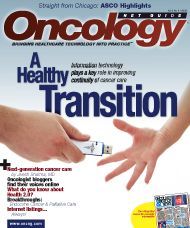Publication
Article
ONCNG Oncology
Oncology Outlook: Next-generation Cancer Care
Oncologists must come to grips with the fact that healthcare is becoming increasingly service-oriented and consumer-centric.
Cancer care is rapidly evolving. Over the last decade we have seen the advent of new chemotherapy drugs and novel classes of agents such as targeted therapies that aff ect signal transduction pathways; angiogenesis inhibitors and vaccines are becoming routine components of care; radiation therapy technologies continue to improve with the arrival of IGRT and other modalities; and minimally invasive surgical techniques are making rapid progress.
Unfortunately, these advances in the science of oncology have been accompanied by a variety of challenges to the fi nancial health of many oncology practices. As reimbursements have steadily declined and tighter restrictions have been placed on the use of many of these novel tools, some smaller practices have been pushed to the brink of insolvency. Th is is in part because oncology practice is increasingly marked by a curious dichotomy, wherein physicians are receptive of the latest advances in clinical science and technology, but resistant to (or unaware of) new developments in information technology that are just as essential to their practices. Commentators in the media have often provided one-sided, inadequate explanations for the causes of this, in many cases lacking the experience and depth of knowledge necessary to truly understand the challenges faced by oncology practices. What many observers (and oncology professionals, as well) fail to understand is that as the treatments we provide for our patients have grown in complexity, so too have the business processes and tools that must be employed to ensure the continued health of our practices. In order to operate efficiently, practices must improve productivity, doing more with fewer people while maintaining or enhancing the services provided to patients.
Oncologists must also come to grips with the fact that healthcare is becoming increasingly service-oriented and consumer-centric. As new decision-support tools emerge in oncology, we will also see more algorithm-driven care with embedded predictive modeling. Some of these tools will be incorporated into EMR systems, adding to the challenges of product selection and implementation many practices are currently facing. Th ese new technologies will not only support the patient journey but also capture information as a byproduct of workfl ow. Mining this information will allow us to optimize operational effi ciencies and clinical outcomes in the pay-for-performance environment required by payers and the changing expectations of oncology patients and their families. Newer patient tools, such as gene expression assays, will not only make risk assessment and cancer care more personalized, but also aff ect how patients utilize our services, requiring us to adjust our business practices. Clearly, the clinical, IT, and business domains will be integrated more tightly than ever before.
The pursuit of next-generation cancer care will always be the correct path. The challenge is to define what that means for oncology professionals and their patients, identify the tools we need to produce the desired outcomes, and find pragmatic ways to pursue our goals. Due to several attractive tax incentives for hardware and software purchases, this year is a particularly important year for making IT investment decisions. How are you building your strategic vision? How will you defi ne the path forward and the priorities that you will pursue? How will you pay for it? Over the next few months, this column will focus on new health IT tools and processes and the ways in which they can benefi t oncology care and the fi nancial health of your practice. I will cover decision-support tools, economic optimization through operational effi ciencies, breast cancer IT systems, utilization of improved clinical pathways, support for the patient cancer care journey, and other topics, reviewing key technology options and providing examples of successful best practices. I welcome your feedback and suggestions, and I look forward to engaging in a discussion about the challenges facing our profession as we move to make next-generation cancer care a reality.
Jivesh Sharma, MD, is CEO of Texas Cancer Associates, a midsize oncology practice based in Dallas/Fort Worth, TX. He is also CEO of HealthIT, an Internet services company that supports the patient/ provider network with technology solutions, and founder of NextGen Oncology, which works to provide next-generation solutions for the diagnosis, management, and treatment of cancer. E-mail Dr. Sharma at JSharma@MyCancerCenter.com.
